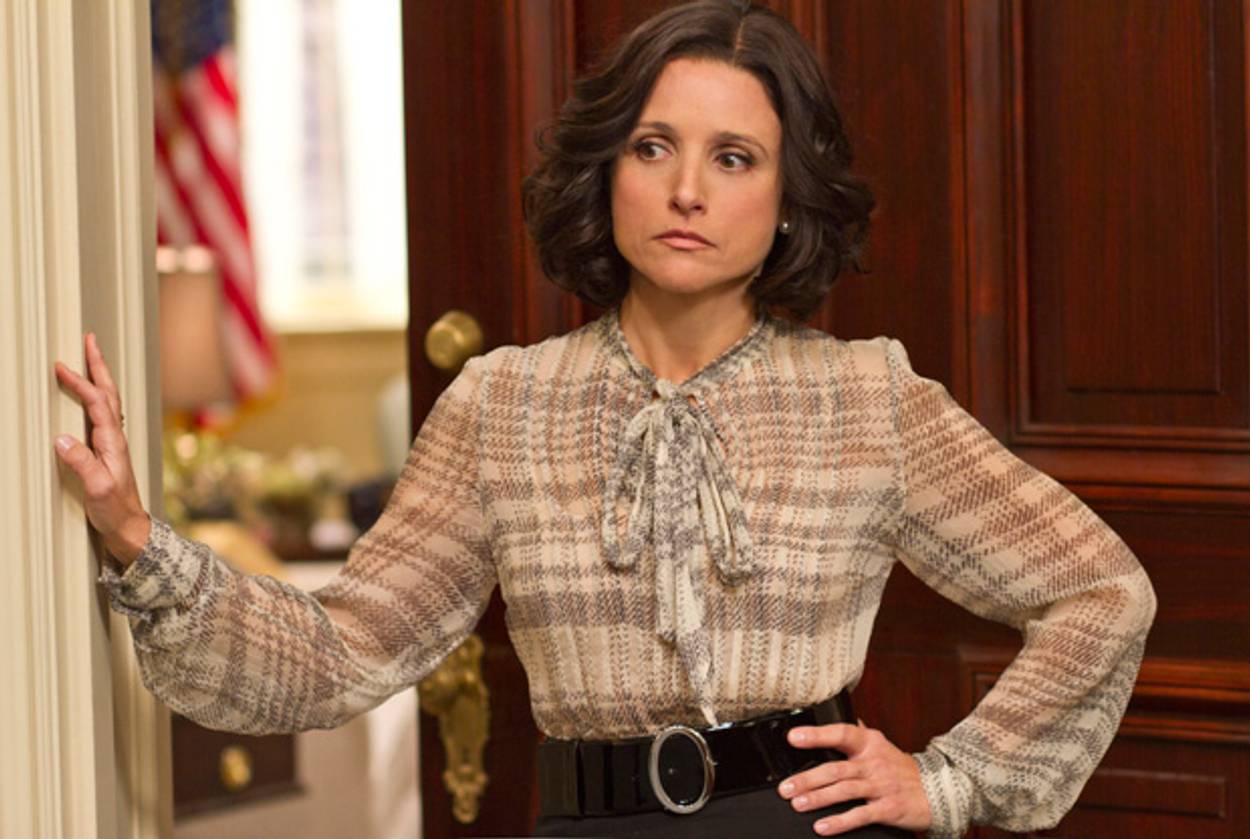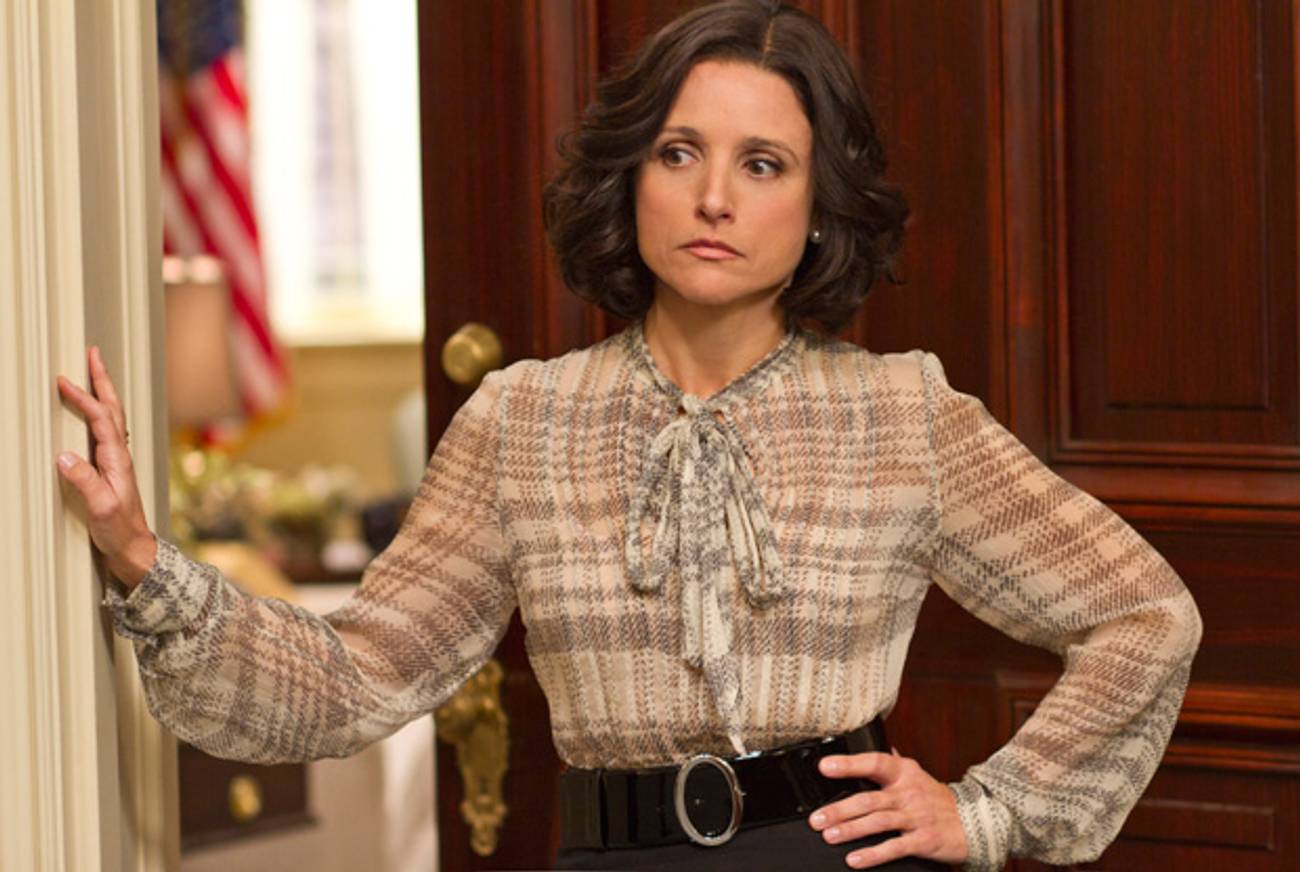HBO’s Veep Gets Religion
The Julia Louis-Dreyfus series takes a religious approach to comedy, which makes it both funny and profound




You know that HBO show everyone’s talking about? The one about the young woman who is a little bit lost, struggling to land her dream job, and swatting her way through a predatory big city that is stifling and dominated by men?
Veep, in which Julia Louis-Dreyfus plays a second-in-command whose capacity for speaking out of turn rivals only that of the real-life second-in-command, is the cable giant’s funniest show in years. The character’s catch phrase is “did the president call?”—a line that Louis-Dreyfus delivers with more bathos and anguish than Lena Dunham’s characters on that other HBO show, Girls, could ever conjure. Whereas Girls allows its women to roam aimlessly through Brooklyn, Veep forces its woman to crawl through the corridors of power. If Seinfeld, which made Louis-Dreyfus famous, was a show about nothing, Veep is a show about many things, all of them niggling but essential. And in paying ample attention to the small details behind big government, it captures something fundamental about human behavior—something true not only of politics but also of faith.
Consider, for example, the main story arc of the first season, which concludes this Sunday. The Veep, Selina Meyer, is trying to pass a clean jobs bill, a task that requires the consent of environmentalists and big oil alike and that rests on the artful stroking of gargantuan egos. Episode after episode is spent with Meyer and her crew devising new ways of practicing the art of the possible. When a combative senator threatens to pull his support if an oil industry executive finds his way onto the initiative’s advisory committee—the latter being an explicit demand of the oil-industry-friendly president—Meyer’s team approaches a former oil executive, a semantic nuance they manage to parade around as a substantive difference.
Most writers who choose to take on the political system as their theme (see under: Sorkin, Aaron) reflexively lean on pomp, reminding us, in well-crafted dialogues, that underneath all the din and the rancor are idealistic and intelligent men and women with soft hearts and lofty goals. But Veep’s creator, Armando Iannucci, is made of sterner stuff; the only inspirational words he allows his characters have four letters. Meyer and her staff curse like Gregorian monks chant, a way of communicating clearly directed at attracting the attention of some higher power.
The religious metaphor isn’t accidental. Before finding his way into comedy, Iannucci, who was born in Glasgow, considered becoming a Catholic priest. He exchanged one ancient order for another and began his doctoral studies at Oxford, writing about Paradise Lost and 17th-century religious language. His education shines through in each scene of his show: Rather than perceive of the Old Executive Office Building as a stage on which to play out large, universal themes, he concentrates on the machinations of power, which are sometimes senseless and often constricting and never too far from incredible.
This insight makes for not only good comedy, but also good religion. The difference between the spiritual person and the religious one is that the latter understands that the former’s good will is inconsequential unless governed by rules. To declare oneself spiritual is akin to declaring oneself a big fan of cheddar: It feels good to say, but it means nothing. If you’re really serious, you ask questions, and if you ask questions, you realize that the greatest one of them all—whether or not there is a God—is unanswerable. And then you have two choices: You either succumb to nihilism or despair, or you make up a set of rules to live by. If you’re theologically minded, these rules assume the existence of a Creator and govern the ways of interacting with the divine. If you’re civic minded, these rules assume the existence of a people and govern the ways of interacting with fellow human beings. Whatever the core belief, without the rules it’s just a fleeting idea.
Serious theologians know that. And serious comedy writers do, too. That’s the reason why shows like Everybody Loves Raymond are so forgettable—they’re like layer-cakes of generalizations—and shows like Veep or Curb Your Enthusiasm are so brilliant; they jam their characters into an airtight fictional world and force them to remain faithful to a codex governing every aspect of their social behavior. Whether it’s an Orthodox Jew keeping six hours between meat and milk or Larry David keeping the number of samples you can have at the frozen yogurt store to two, writing up laws and obeying them is how you keep the faith, and the laughs, alive.
And writing laws is the Veep’s métier. In just eight episodes, the show’s first season built up a universe that is claustrophobic and delightfully absurd. There’s no walking-and-talking here; instead, viewers are prompted to feel the same unease that Meyer and her staff members feel, and like them care less about education, the environment, and the economy and more about vote tallies, filibusters, and remembering the name of that guy from that lobby who might be useful in promoting a future policy initiative.
Later this month, as Veep goes on its summer hiatus, it’ll be replaced by Sorkin’s The Newsroom, which, judging by its trailer, looks just as mawkish as any of his other shows. Here’s hoping that come fall, Vice President Meyer will return, hiss out a few choice words, and launch right in to the minutia—the small things, the things that irritate us but that we have to do anyway, the things, in other words, that take up so much of life for so many of us. This, one suspects, is probably why the fifth commandment orders us to respect our parents rather than, say, love them. Love is ephemeral. Respect is an action plan. It was true in Sinai, and it’s true in D.C. as well.
***
Like this article? Sign up for our Daily Digest to get Tablet Magazine’s new content in your inbox each morning.
Liel Leibovitz is a senior writer for Tablet Magazine and a host of the Unorthodox podcast.
Liel Leibovitz is editor-at-large for Tablet Magazine and a host of its weekly culture podcast Unorthodox and daily Talmud podcast Take One. He is the editor of Zionism: The Tablet Guide.